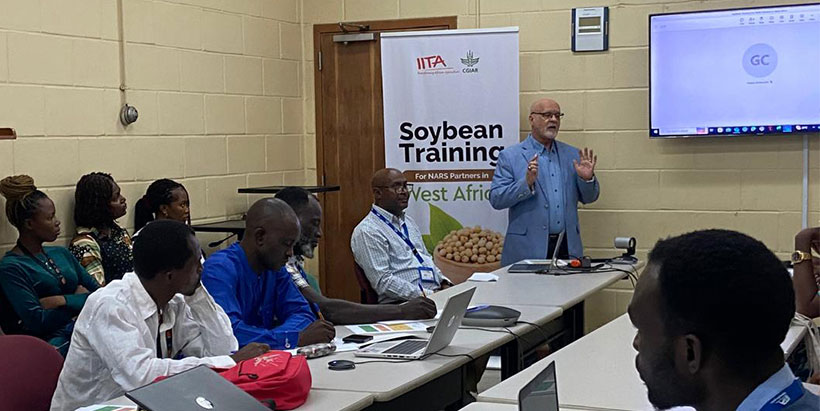Nigeria
8 July 2024
The IITA Soybean program organized a training session for National Agricultural Research Systems (NARS) partners in West Africa under the ‘Strengthening soybean improvement for Africa’ project. The Bill & Melinda Gates Foundation-funded project aims to strengthen the CGIAR-NARS partnership on variety development and testing efforts. The inaugural training, held at the IITA headquarters from 19 to 22 June, aimed to harmonize and standardize soybean variety development, evaluation, testing schemes, and data collection and management techniques among IITA–CGIAR and NARS partners.
 Participants listening to a facilitator during the workshop.
Participants listening to a facilitator during the workshop.
IITA Soybean Breeder and event convener, Abush Abebe, emphasized that the meeting was not merely a training session but a platform to share experiences and create a common understanding among the breeders representing the various NARS partners, i.e., the National Soybean Breeding Programs of Benin, Mali, and Nigeria, and Universities in Nigeria (the Ajayi Crowther University, University of Ilorin, and Joseph Sarwuan Tarka University (JoSTUM) (Formerly the Federal University of Agriculture) Makurdi, and the University of Ekiti) on various areas of collaborations with the NARS partners. He stressed the importance of strengthening partnerships and developing a standardized variety testing and evaluation protocol to increase efficiency and improve soybean breeding and research. “Bad data misleads the end-users, but good data equals good decisions,” he said, highlighting the critical role of high-quality data.
In his opening remarks, IITA Deputy Director General, Partnerships for Delivery (DDG-P4D), Kenton Dashiell, a soybean breeder at IITA from 1983 to 2001, expressed his enthusiasm in the meeting. He encouraged the network to expand its breeding program and build a strong team to achieve its goals more effectively. “The success of this program is based on the work you do in your stations, which is why this workshop is important,” he stated.
The IITA Soybean Breeding Program Lead, Godfree Chigeza, spoke on the importance of the CGIAR-NARS partnership and the African soybean improvement network. He outlined the network’s goals, framework, expectations, and partnership requirements, emphasizing the shift from participatory variety selection to participatory breeding, where joint priority and decision-making are crucial.
 IITA Deputy Director General Partnerships for Delivery Dr Kenton Dashiell during the opening remarks on the first day of the workshop.
IITA Deputy Director General Partnerships for Delivery Dr Kenton Dashiell during the opening remarks on the first day of the workshop.
IITA Head of Breeding Mushoriwa Hapson highlighted the shift from capacity building to capacity sharing, focusing on exchanging ideas and information. He noted that the training should enhance the network’s collaboration to deliver better results and amplify impact. The IITA soybean program aims to build an inclusive seed system to produce adequate seed and deliver high-yielding, farmers- and market-preferred soybean varieties. “I hope that the soybean breeding program, together with you, will co-develop, co-implement, and co-deliver the best results in soybean breeding,” he said.
Abebe presented an overview of soybean research in West Africa, tracing the history of the soybean improvement program at IITA that began in 1974. He noted initial challenges such as low yields, poor seed viability, inadequate nodulation with native Rhizobium, high shattering in different zones, and limited utilization due to few suitable recipes for small-scale farmers were the main drivers for establishing the IITA soybean improvement program. He underscored the need for a strategy to regularly replace varieties to ensure higher productivity, reduce the impact of emerging diseases and pests, respond to changing consumer and market preferences, and increase adoption rates. Factors driving the demand for new varieties include enhancing yield potential, quality, and maturity and mitigating climate change.
Highlighting some of the key reasons for exerting aggressive efforts to develop new varieties in West Africa, Abebe mentioned very low soybean yields in many of the SSA countries, expanded soybean production on the continent, which demands more new varieties, increasing interest in soybean research for delivery, increased demand for soybean products like soy oil and soy meal, limited national breeding programs that resulted in weak variety testing and registration networks, and slow rate of replacing old varieties with new and high yielding varieties.
Ibnou Dieng, a biometrician at IITA, discussed the need to ensure data quality and integrity, the implications of poor data, and ways to minimize experimental error. He also provided a practical demonstration of breeding analysis using the CGIAR market intelligence app. Dean Muungani, IITA Product Manager for Grain Crops, guided participants through soybean tricot on-farm testing, breeding program assessment, and costing. Participants also toured the IITA soybean breeding program facilities and conducted practical field demonstrations on trial layout, planting, and crossing.
At the end of the training, participants were provided with digital tools like tablets for effective electronic data capturing. Abebe noted that plans are in place to provide more tools to help standardize the data collection techniques and ensure data quality.